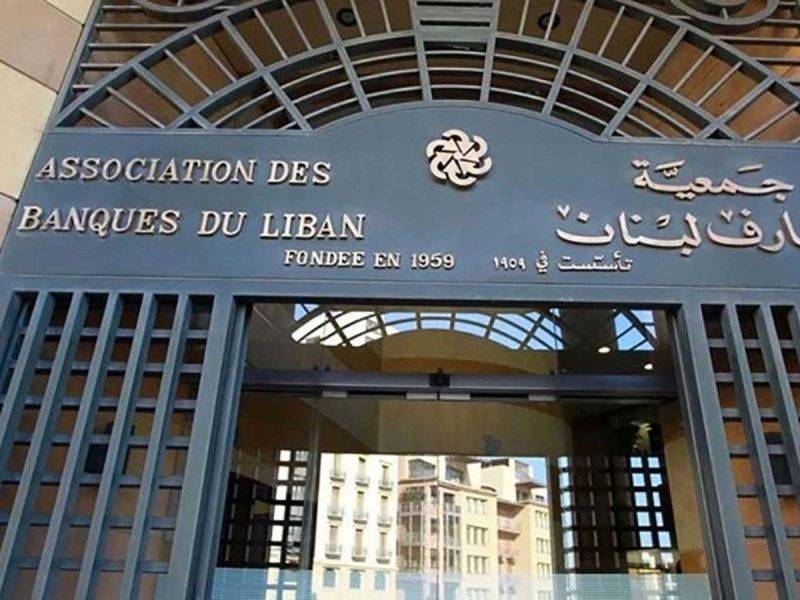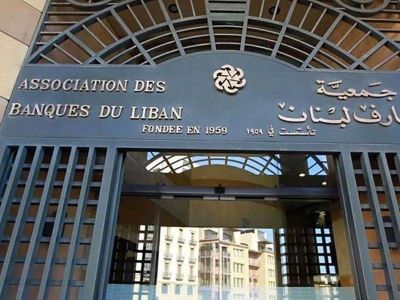
The Association of Banks in Lebanon headquarters. (Credit: NNA)
The judicial battle that Ghada Aoun declared earlier this month against banking institutions, following a complaint accusing the banks of “wasting public funds, illicit enrichment, breach of trust and fraud against depositors,” does not appear as if it will end anytime soon.
In addition to the two-day strike that the banks went on last week in response to Aoun’s decision to freeze all the assets of the six banking institutions and those of their chairmen, and to bar the latter from leaving the country, the Association of Banks in Lebanon resorted to the judiciary.
Through its lawyer Akram Azouri, the ABL on March 16 filed a legal request demanding that the Mount Lebanon Court of Appeal, presided over by Rima Chbaro, dismiss Aoun from the case. He also brought a lawsuit against the state alleging “serious faults” by Judge Aoun on March 22 before the plenary assembly of the Court of Cassation.
Moreover, Bank of Beirut and Bank Audi, legally represented by Azouri and which are among the six banking institutions targeted by the restrictive measures (in addition to BLOM Bank, SGBL, BankMed and Credit Bank), also lodged lawsuits. It is noteworthy that SGBL CEO Antoun Sehnaoui on March 3 filed a legal action requesting to have Judge Aoun recused from the case.
Speaking to L'Orient-Le Jour, Azouri explained the banks’ and ABL’s interest in the two lawsuits simultaneously. “The recusal request filed against Judge Aoun aims to remove her from the case, so as to prevent her from going on with her proceedings. The lawsuit against the state for gross misconduct by the judge would result in nullifying the decisions she has already made. If successful, the bank and bankers' asset freezes and travel bans will be invalidated.”
The two lawsuits involve different procedures. “In the case filed for the recusal [of a judge], the recusal takes effect once the concerned judge is notified,” Azouri said, and pointed out that in this case “the prosecutor refuses to be notified.”
As for the lawsuit against the state, once submitted to the clerk's office, the case is immediately taken away from the judge,” he said. “Article 751 (last paragraph) of the Code of Civil Procedure provides that when such an action is filed, a magistrate can no longer undertake an act related to the plaintiff,” he said.
Prejudice and abuse of power
In his recusal request before the Mount Lebanon Court of Appeal, the lawyer invoked “prejudice” as a ground for complaint. “When Bekaa's first investigating judge, Amani Salameh ordered in April that the assets of all 14 banks be seized, Judge Aoun had congratulated her,” he recalled. Judge Aoun tweeted that she would like to “join the club of judges,” of which Salameh is a prominent figure. “Today, 11 months later, she is issuing a similar judgment,” the lawyer noted.
Before the plenary session of the Court of Cassation, the ABL and the two banks accused Aoun of abuse of power. “A public prosecutor cannot rule [in a case]. He cannot therefore decree measures on people and property,”Azouri said.
Speaking to L'Orient-Le Jour, a judicial source had the same opinion, saying that it is up to the investigating judge, to whom a prosecutor would have referred a case, to take restrictive measures, such as an arrest, a judicial supervision or a travel ban ... As for the seizure of assets, it is the judge of the enforcement department, not the prosecutor, who has the powers to order it, the source added.
In the same vein, the lawyer condemned Aoun’s decision barring the six concerned banks from shipping money last week. Lebanon's top prosecutor Ghassan Oueidat on Monday overturned this decision, mainly “not to harm the national economy.”
This reason made a member of the organization defending the depositors’ rights smile bitterly. He said, “the economic abyss is already very deep.”
In contrast, Azouri praised Oueidat’s decision. Three days prior to his decision, Azouri had sent him an open letter on behalf of the ABL, urging him to “suspend the enforcement of [Judge Aoun’s] decision to instruct the customs authorities to prevent these six banks from transferring money.”
For the ABL, this ban would isolate the Lebanese banks from their foreign correspondents, and more generally “undermine the remaining confidence in the banking sector.”
The lawyer deplored the wide publicity around Aoun’s decisions in the local and international media. In this regard, he warned against disturbing relations between local and foreign banks. “Western banks would not want to continue to deal with banks hit by serious measures,” he said. He indicated that “they [the banks] have committees of prudence and ethics whose responsibility it is to verify whether or not it is possible to continue to deal with suspect banks.”
“Since Judge Aoun began to take action against banks and their CEOs, bank officials have been in constant contact with the international correspondent banks to explain that the prosecutor acted without jurisdiction and that her decisions are bound to be overturned,” Azouri added.
This article was originally published in French in L'Orient-Le Jour. Translation by Joelle El Khoury.
In addition to the two-day strike that the banks went on last week in response to Aoun’s decision to freeze all the...
